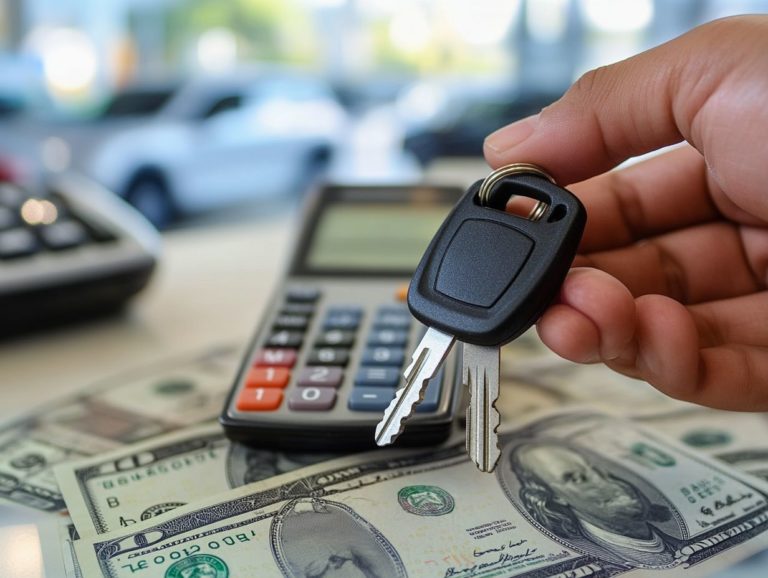Understanding APR: A Guide for Car Buyers
When it comes to financing a vehicle, understanding APR, or Annual Percentage Rate, which is the total cost of borrowing, is absolutely essential.
This guide will illuminate what APR is and why it matters for car buyers like you. You ll find everything you need to know right here, from its impact on your monthly payments to the various factors that influence your APR.
You ll also uncover strategies to secure the best rates and spot hidden fees that might lurk in the shadows. Are you ready to navigate your financing options with confidence? Let s dive in.
Contents
Key Takeaways:

- APR is a crucial factor for car buyers to consider when financing. It determines the interest rate on your loan and can greatly impact your monthly payments and total cost.
- Several factors, such as credit score, loan term, and type of vehicle, can affect your APR. Improve your credit score and negotiate with lenders to get favorable terms.
- Read the fine print and understand all the elements that make up your APR. Look for hidden fees and penalties that can increase the overall cost of your car loan. Consider alternatives like leasing or buying used for potentially better rates.
What is APR?
The APR is a measure that shows you the cost of borrowing money over a year. It goes beyond merely showing the nominal interest rate applied by lenders; it also includes various loan fees.
Understanding the significance of APR equips you with a clear picture of what you will ultimately pay, making it essential for anyone contemplating a vehicle loan from banks or credit unions.
Definition and Importance
The definition of APR encompasses a thorough assessment of your total borrowing costs, represented as an interest rate. It includes any associated fees that might come your way.
Understanding APR is essential as it significantly influences your budgeting for loan payments and helps you make well-informed financial choices. By knowing the total cost of borrowing, you can evaluate different loan offers critically.
This knowledge gives you the power to compare your options effectively. You can choose loans that align with your financial goals and capabilities, leading to enhanced fiscal management and helping you avoid unnecessary debt.
How APR Affects Car Buyers
Understanding how APR influences your car-buying experience is crucial, as it directly affects both your monthly payments and the overall cost of your vehicle loan.
A higher APR results in elevated monthly payments, making it imperative to carefully assess the interest rate and loan term while exploring financing options for both new and used cars.
Impact on Monthly Payments and Total Cost
The impact of APR on your monthly payments and the total cost of a vehicle loan is substantial. A higher APR can significantly increase monthly payments and create a heavier financial burden.
For example, imagine taking out a $20,000 loan for five years at an APR of 3% versus 6%. With a 3% rate, your monthly payment would be around $359, resulting in a total cost of about $21,500 over the life of the loan.
Now, consider what happens with a 6% APR: your monthly payment rises to approximately $387, pushing the total cost to nearly $23,220. This stark difference illustrates how just a few percentage points can dramatically affect your financial obligations.
It emphasizes the importance of securing a lower rate to ease the strain of debt repayment and refine your overall financial strategy. Don t miss out on the chance to save!
Factors that Affect APR

When determining the APR for auto loans, several key factors come into play. Your credit score, the length of the loan term, and the type of vehicle you re financing all influence the interest rate lenders may offer.
Lenders evaluate these elements to assess the level of risk involved, which directly impacts the rate you might receive.
Key Factors Influencing Your APR
Your credit score, loan term, and vehicle type can significantly impact the APR you receive. Generally, a higher credit score leads to lower rates, which benefits you.
This dynamic is essential for lenders as they assess the risk tied to your loan application. A strong credit score showcases your trustworthiness with money, giving lenders confidence in your ability to repay debts.
The loan term you select whether short or long also plays a crucial role in how interest accumulates. Shorter terms often result in lower overall interest costs, making them more appealing to lenders.
The type of vehicle you finance also influences the APR. Newer or higher-value vehicles are typically regarded as lower-risk collateral, which could lead to a more favorable rate for you.
All of these factors work together, and their combined effect is vital in determining the best borrowing conditions for your needs.
How to Get the Best APR
To secure the best APR, focus on boosting your credit score. Master the art of negotiation with lenders.
By understanding your financial situation and exploring prequalified loan options, you can empower yourself in discussions with financial institutions.
This approach not only gives you leverage but also positions you to potentially reduce your borrowing costs significantly.
Boost Your Credit Score and Negotiate Smartly
Improving your credit score is crucial for securing a lower APR as it reflects your trustworthiness with money in the eyes of lenders.
By taking proactive steps now, you can position yourself favorably before seeking financial assistance. Start by checking your credit report for errors; disputing inaccuracies can help elevate your score. Paying down high credit card balances and ensuring your bills are paid on time showcases responsible credit behavior.
Once you feel confident in your score, it’s time to negotiate with lenders. Equip yourself by researching current interest rates, allowing for informed discussions about potential offers. Don t hesitate to inquire about reducing fees or securing better terms; after all, you deserve the best deal possible.
Understanding the Fine Print
You must read and understand all the terms in loan agreements, as hidden fees and penalties can greatly affect the total cost.
Common fees such as the loan origination fee, administrative fees, and additional expenses can quickly inflate your initial borrowing costs.
It s essential to read and comprehend all the terms before signing, ensuring that you are fully informed and prepared for any financial implications.
Stay Alert for Hidden Fees and Penalties

Remain vigilant about hidden fees and penalties in the fine print of your loan agreements, as these can inflate your overall borrowing experience.
Such fees may include prepayment penalties, late payment charges, and even origination fees that can unexpectedly increase the total amount you owe. To navigate this effectively, review your loan documents with meticulous attention.
Focus on sections labeled Additional Charges or Fee Disclosure to uncover unexpected costs that may not be immediately apparent.
By understanding these components, you can make informed decisions and ultimately avoid unnecessary financial strain in the future.
Discover Exciting Alternatives to Traditional Financing!
Exploring alternatives to traditional financing opens up a world of flexible and often more affordable options for you as a car buyer. Consider leasing a vehicle or opting for a used car. These choices can significantly reduce your immediate financial burdens.
Plus, they often come with lower down payments compared to conventional vehicle financing from financial institutions. This way, you can drive away in the car you want without stretching your budget too thin!
Leasing, Buying Used, and Other Options
Leasing a vehicle or purchasing a used car presents appealing alternatives to traditional auto loans, offering substantial savings through smaller down payments and lower monthly payments.
These options are particularly attractive if you’re looking to manage your finances more effectively. With leasing, you can enjoy the luxury of driving a new vehicle every few years without the long-term commitment. This is ideal for those who appreciate flexibility.
Conversely, buying a used car may provide even greater long-term value, especially when you factor in depreciation rates. Each option comes with its own unique advantages and challenges.
Credit unions often offer competitive rates and lower fees, making either choice more affordable. Ultimately, the decision can align with your financial strategies, tailored to your individual circumstances, preferences, and long-term aspirations.
Frequently Asked Questions
What is APR and why is it important for car buyers?
APR stands for Annual Percentage Rate, which shows the total cost of borrowing money. It s important for car buyers because it helps them understand the true cost of financing a vehicle and allows them to compare different loan options.
How is APR different from interest rate?

APR includes both the interest rate and any additional fees or charges associated with the loan, such as origination fees or points. Interest rate only refers to the cost of borrowing money. APR gives a more comprehensive picture of the total cost of the loan.
What factors can impact the APR for a car loan?
The APR for a car loan can vary depending on factors such as the borrower s credit score, the length of the loan, and the type of vehicle being financed. The APR may also be affected by any special promotions or incentives offered by the lender.
Is a lower APR always better for car buyers?
In general, a lower APR means lower interest charges and a lower overall cost of financing a vehicle. However, it’s important for car buyers to also consider the length of the loan. A longer loan term with a lower APR might end up costing more in the long run compared to a shorter loan term with a slightly higher APR.
Can I negotiate the APR for a car loan?
Yes, it is possible to negotiate the APR for a car loan. It’s important for car buyers to shop around and compare offers from different lenders to find the best APR for their specific situation. They can then use this information to negotiate with the lender for a lower APR.
Are there any other fees or charges I should be aware of when financing a car?
Yes, in addition to APR, car buyers should also be aware of any other fees or charges associated with their loan, such as loan origination fees, title fees, and taxes. It’s important to carefully review all costs and fees before signing a loan agreement.
Ready to explore your financing options? Act now to secure the best deals available!






